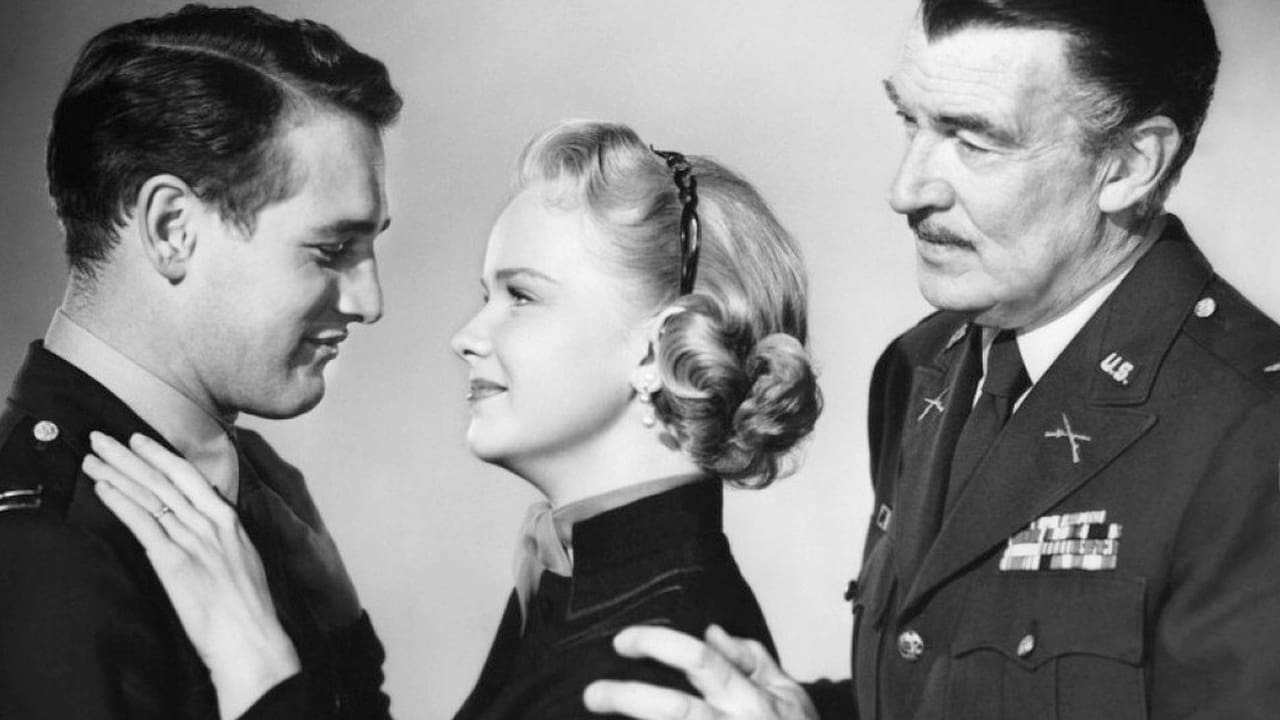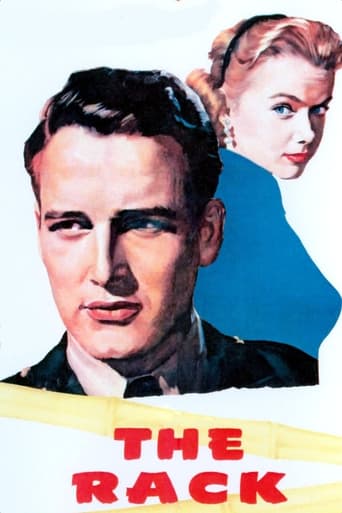

Directed by Arnold Laven, this Stewart Stern screenplay was based on a teleplay by Rod Serling. It stars Paul Newman as a Korean War veteran who returns home after years as a P.O.W. to face a court martial trial for collaborating with the enemy.It's a very good drama with an excellent, credible performance by Newman and the rest of the film's notable cast including Wendall Corey as the initially reluctant yet duty bound prosecutor, Walter Pidgeon as Newman's stern "by the book" Army Colonel father, Edmond O'Brien as Newman's more than capable defense attorney, Anne Francis as Newman's sympathetic and recently widowed sister-in-law, Lee Marvin and James Best as two of Newman's accusers, and Cloris Leachman (in a cameo) as Francis's friendly neighbor.Captain Edward Worthington Hall Jr. (Newman) needs medical assistance to exit the "returning troop" plane at the San Francisco airport. His father Colonel Edward W. Hall Sr. (Pidgeon) and sister- in-law Aggie (Francis), who are there for his return, are unable to greet him as he's loaded into an ambulance and taken to a military hospital by the Golden Gate Bridge.Through her neighbor Caroline (Leachman), it is learned that Aggie lives with her father-in-law, Edward Sr., because her husband, his son, was killed in the Korean War. Ed meets with a psychiatrist, and later with his family (Robert Blake appears as a soldier being mobbed by his family), but is unable to say much, though he is clearly troubled by something. Still wheelchair bound and recovering in the hospital, Ed wheels himself in to watch a movie (featuring Debbie Reynolds mixing chemicals) with others when another patient (Marvin), in crutches himself, slips a noose with the word "traitor" around his neck.Shortly thereafter, Major Sam Moulton (Corey) is explaining to Ed (who was introduced to him by Dean Jones) that he's being brought up on charges for giving aid and comfort to the enemy in time of war which, if convicted, will mean a court martial.Earlier, Moulton had been told by Colonel Hansen (Robert Burton) that the Army must try the most egregious (40) of these cases to set an example, when he had objected to prosecuting an Army Captain that had received the Silver Star. However, Ed is allowed to stay out of jail with no restrictions given his otherwise exemplary war record.Physically recovered and released from the hospital, Ed returns home to find that his father, the Colonel, and Aggie have invited all their friends and neighbors over to celebrate his return. Not feeling very cheerful, Ed later excuses himself early from the party and retreats to the kitchen where he and Aggie speak briefly.The Colonel later joins him and they have some brief, awkward moments together before they are interrupted by a guest, such that Ed still hasn't had a chance to tell his father about the charges. Realizing he probably won't get the chance that evening, Ed goes to bed early.After the party is over, a friend of the Colonel's, a fellow Army Colonel Dudley Smith (Fay Roope), arrives and the two old buddies begin to have a drink. Aware of the charges against his friend's son, Smith remarks that the Colonel seems to be taking it well. Pressed for what he means, Smith mentions the court martial which prompts the Colonel to charge up the stairs muttering "my son honored me" as he barges into Ed's room to wake him. Shocked to learn the truth, the Colonel yells at his already ashamed son and runs from his room and back down the stairs as Ed gives chase trying to justify his crime.In the next scene, Lt. Colonel Frank Wasnick (O'Brien) visits Ed at a hotel, where he is now staying, and drinking. Wasnick quickly supports Ed saying that the court martial is not the foregone conclusion that he thinks it is, and that he would have probably done the same thing under the circumstances.After several weeks have passed, the trial has begun (Robert Simon appears at the court's law officer). One by one, as Major Moulton presents his case, it seems that Captain Hall willingly collaborated with the enemy. Now civilian Millard Cassidy (Best) testifies that he saw the accused strike a wounded, fellow soldier in the P.O.W. camp. Sergeant Otto Pahnke (Adam Williams) says that the Captain tried to get him to sign a leaflet that he had signed which accused the U.S. Government of false pretenses for even being in Korea. Wasnick does a pretty good job negating Pahnke's testimony, however, first establishing a 6 month time period in which the Captain hadn't been seen. Then, getting the native Pole to admit that Ed had a frightened look which resembled what he had seen in the eyes of Dachau survivors, when he'd finally reappeared and asked the Sergeant to sign the paper.But the most damaging testimony comes from Lee Marvin's character, a fellow Captain named John Miller. Miller had been in charge of a failed escape attempt, which he'd later been told was leaked to the enemy by Captain Hall. Miller then described the torture he was subjected to in great detail, and testified that the only information the Chinese got from him was his "name, rank, and serial number!". He was then allowed to remove his shirt and pants to show what he suffered.Things looked pretty hopeless for Ed and he returns from a night of drinking to find Aggie in his hotel's lobby. She's brought him some clean shirts but her real purpose is to encourage Ed to fight the charges against him. Perhaps inspired by her words, Ed takes the stand the next day and tells the other side of the story.Wasnick begins his defense by introducing the concept that "every man has his breaking point". There is a tearjerking moment between father and son and a quick ending to the film.
... View MoreThere are Many Things that are Powerful in this Court Martial Movie. An Early Paul Newman Performance, and a Fine, Important Supporting Cast, but there is a lot of Ambiguity as the Film Kowtows to the Military Behind the Scenes Watchdogs and Fudge Facts about the True State of Affairs Concerning POW's and Collaboration with the Enemy.It was a Fact that 1 in 7 POW did Collaborate, not the Miniscule "Only 40" that the Film would have You Believe and so on. Also, the Intertwining of the Soldiers Home Lives and Their Lack of Love from Father is more of a Dramatic Inclusion for a Stage Play than would seem Necessary with an Approach Toward Battle Hardened Officers and NCO's.This Muddle makes the Movie Easier to Watch as a Drama but it All gets a bit Confusing with the Overlap. As a Film it is a Sombre Affair and is a Curioso of its Time and is Interesting in that Respect, but it Reeks of Propaganda and Rug Sweeping about a War that had just Ended and this Seems like a Rush Job by the Military and a Half-Hearted Effort by MGM to get the Thing Over with as it was not going to be Box Office, and the Fact that the Movie is so Little Known Today is an Indication of its Inaccuracy and its Ability to Entertain and Enlighten.
... View MoreCaught this rarity on TCM. Much heavy duty talent is involved in this production - Rod Serling as writer, and the acting talents of Paul Newman (his second screen appearance), Edmund O'Brien, Walter Pigeon, and Anne Francis, with bits by Lee Marvin and Chloris Leachman, even! The effort must be marked as a success, with an even-handed treatment of the issue of "breaking point" in a war when the Koreans openly sought to crush their POW's thru "brainwashing", a term that came into currency at that particular time. The cut and dried atmosphere of the courtroom proceedings are balanced by portrayals of the personal effects of the tragedy on the principals, especially the searing scenes between Newman/Hall and his father. A thoughtful film dealing with a major issue of the day, that is well worth seeing.
... View MoreNothing new about this court film. Classical directing, classical writing... So what's good about it? Paul's acting is very moving. Second role (the lawyer) is also worth the watching. And, well, if I had a chance to see this as a play, I would not hesitate. But, maybe, the director is too much absent and a more daring directing may have enhanced the drama!
... View More